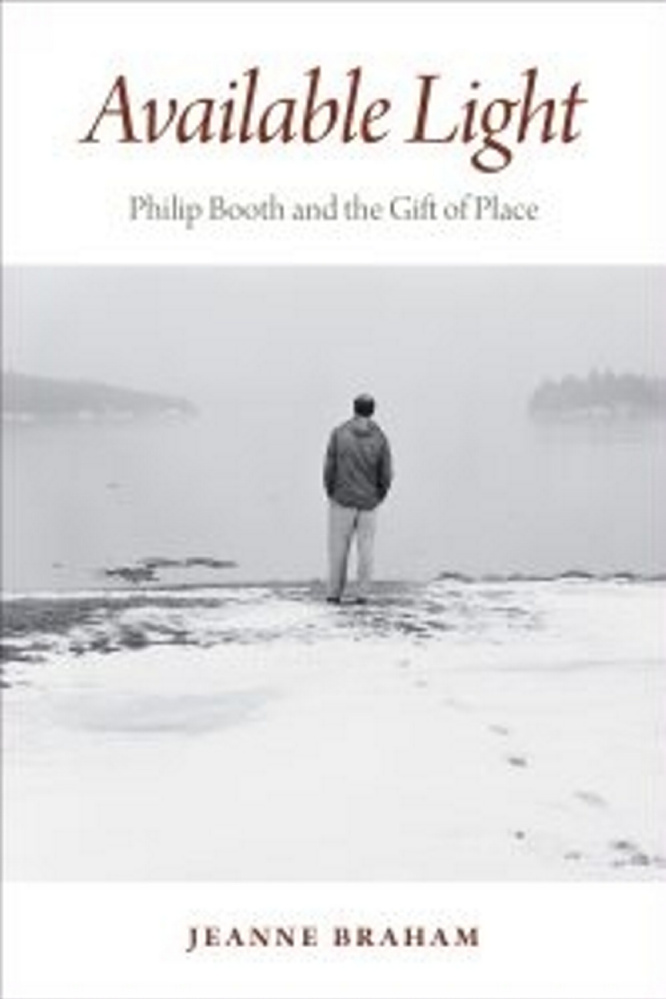“Available Light: Philip Booth and the Gift of Place”
By Jeanne Braham
Bauhan Publishing, Peterborough, New Hampshire, 2016. Color photographs; 144 pages, paperback, $23.95
There should be more books like Jeanne Braham’s “Available Light.”
This compact, readable little volume provides an introductory study of the life and widely admired poetry of Philip Booth, focusing particularly on his deep ties to the town of Castine.
Booth, born in 1925, grew up in Hanover, New Hampshire, where his father was a literature professor at Dartmouth College. The family spent summers in Castine, where his mother’s family had lived for generations. He studied literature at Dartmouth and Columbia universities, served in the Air Corps in World War II, crossed paths with Robert Frost, went on to teach at Bowdoin College and Wellesley College, and eventually became a founder of the esteemed creative writing program at Syracuse University. Along the way he became friends with many of the highest-profile writers and artists in the Northeast, and “Available Light” looks extensively, for example, at his relationship with Robert Lowell, who also summered in Castine in the 1960s and ’70s.
While Booth spent most of his academic years in the towns where he taught, he returned practically religiously to Castine every summer. He was well-known and liked by summer people and locals alike, Braham tells us, and he had a reputation as an excellent sailor and sailing instructor. As his literary teaching career wound down in the mid-1980s, he and his wife, Margaret, made the town their primary residence, to the time of his death in 2007.
Using personal interviews with family members together with biographical documents (such as Philip Conkling’s dialogue with Booth published in 1988 in the Island Journal) and Booth’s diverse writings, Braham shows how the particulars of life in Castine informed the subject matter and even the poetics of his poetry. In his later poetry, Braham for example observes, “the techniques he used in his poems began to resemble the craft of the boatbuilders he so admired — carving out the shape stroke by stroke, form following function.” Braham’s reading is thorough and sound: She details Booth’s thinking about this metaphor and shows us examples in the poetry without belaboring the point.
The book’s readability stems not just from Braham’s easygoing, non-academic prose, but from her approach to the material as more or less a narrative of Booth’s life, which is in turn gratifyingly colored by her own appreciative experiences of the poetry. The result is a strong sense of Booth’s humanity, which is strongly enhanced by the many photographs of Booth, his friends, family and Castine sprinkled throughout the pages. “Available Light” meticulously does exactly what it sets out to do: show us who Philip Booth was and why and how his poetry has affected so many people.
To reiterate: There should be more books like this. Walt Whitman, in his miscellaneous notes on poetry, wrote that “to have great poets there must be great audiences.” In our present aesthetic milieu, we have a lot of competent poets vigorously promoting their own work and “brands” (to use a word that in this context turns my stomach, yet nonetheless seems timely) but not, by and large, attending much to each other. The audience that would be great appears preoccupied with itself. “Available Light” is an example of one of the important kinds of audience attention necessary to great poetry.
Jeanne Braham has taught literature and creative writing in a number of colleges in the Northeast. Her books include “The Light Within the Light: Portraits of Donald Hall, Richard Wilbur, Maxine Kumin, and Stanley Kunitz” and “Starry, Starry Night: Provincetown’s Response to the AIDS Epidemic,” among others.
Off Radar takes note of books with Maine connections every other week. Contact Dana Wilde at universe@dwildepress.net.
Send questions/comments to the editors.



Success. Please wait for the page to reload. If the page does not reload within 5 seconds, please refresh the page.
Enter your email and password to access comments.
Hi, to comment on stories you must . This profile is in addition to your subscription and website login.
Already have a commenting profile? .
Invalid username/password.
Please check your email to confirm and complete your registration.
Only subscribers are eligible to post comments. Please subscribe or login first for digital access. Here’s why.
Use the form below to reset your password. When you've submitted your account email, we will send an email with a reset code.